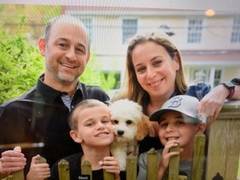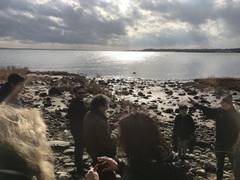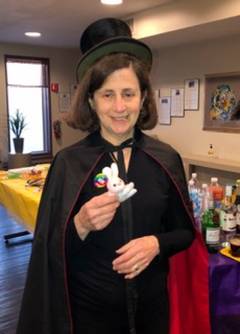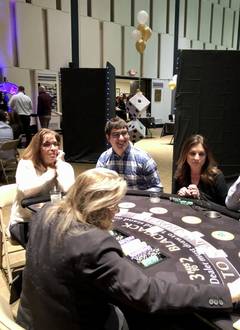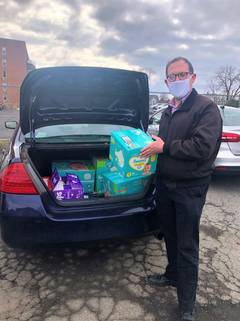Rosh Hashanah Day 1 5785-2024: A Thin Thread of Hope
10/06/2024 05:45:43 PM
Rabbi Ben Goldberg
| Author | |
| Date Added | |
| Automatically create summary | |
| Summary |
I had the opportunity to visit Israel just after Purim this past spring, on a long-planned group trip through Daniel’s work. It obviously ended up being a very different kind of trip, to a very different Israel, than what we anticipated when we planned it a year prior. One of the most difficult, but also most impactful places we visited was Kibbutz Kfar Azza. This kibbutz is right on the border with Gaza and was one of the hardest-hit communities on October 7. Our host was a lifelong resident of the kibbutz named Hen. She happened to be abroad on October 7, and she and her family all somehow survived the assault that killed dozens of their friends and neighbors.
As we neared the end of our brief time together, Hen, who knew that we were all connected to Jewish education and community in the US in various ways, said something extraordinary to us. Take care of the next generation, she said. Make sure they feel confident and strong in who they are as Jews. She even apologized that she and Israeli society couldn’t do more to help us with the problems we face as American Jews, as if she owed us such an apology. But it was quite striking to see that she, of all people, despite her own grief and trauma and uncertainty, saw fit to return some of the solidarity and support we were there to offer. Her words spoke to a sense of commitment and responsibility for the future, in spite of it all.
To say the least, it has been an extraordinarily difficult year for the Jewish people since we last gathered here for Rosh Hashanah. There are the obvious reasons: the pogrom of October 7, with its many grieving families and friends; the war and the tremendous strain it has put on Israeli society; the recent, scary escalation with Hezbollah and its Iranian sponsors; the hostages and the tremendous uncertainty about their fate; the displaced families from Israel’s north and south; the antisemitism around the world and in our own country that the war surfaced, particularly on campuses and other elite spaces; internal disagreements within Jewish communities and families relating to Israel, and so on.
But behind each of these phenomena, what I think really made this year so difficult was the way that events further destabilized a certain consensus that for most of our lifetimes enabled us as a Jewish people to thrive both in Israel and around the world, including in this country.
What was that consensus? In a recent book, the journalist Joshua Leifer described it as the combination of three ideas. First: liberalism–the commitment to freedom of religion and expression within a multifaith, multicultural democracy, and to individual rights and a capitalist economy more broadly. Second: Americanism–the notion that America really was qualitatively different from the places Jews had previously made their homes. And third: Zionism–support for the State of Israel not just as a political position we happen to hold but as something core to our identity as Jews.
But events of the last year, and of the last many years, have challenged this consensus. The challenges to Zionism came from many directions. First was on October 7 itself, where the state that was founded to protect the lives of Jews was simply absent as hundreds were brutally slaughtered in a pogrom. The promise of Zionism was that in a Jewish state, such atrocities would not occur, as they did too often in the Diaspora. But they did occur, and Israeli society and the Jewish people have not even begun to digest the resulting sense of violation and betrayal.
Within the Jewish community, the war has surfaced increasing voices, especially but not only among the younger generation, who see Israel not as the exemplar of their Jewish values, but as the opposite of them. There is a reasonable, non-antisemitic case to be made for this point of view, even as we may hotly contest it among ourselves. But it is clear that the time when Israel was a nearly universal point of pride and consensus among American Jews has passed. Most obviously, Zionism came under attack from those who celebrated these Israeli deaths, and, in an instantiation of an ancient allergy to Jewish power, saw in Israel’s mere existence the paradigm case of everything that is wrong with the world
The other components of this consensus have also weakened, under attack from many directions. Liberalism–by which I mean a commitment to the basics of liberal democracy, not left-wing policy ideas–has come under attack by the extremes of the political spectrum, who would rather shut down speech they don’t care for and impose their worldviews on the rest of society. As Jews, we are history’s great dissenters, living by an alternative value system to whatever is in power around us. For this reason, we have thrived in pluralistic liberal democracies like the United States, and the threats to it are threats to us. Nowhere was this clearer than on college campuses, places that are supposed to function on nuanced, reasoned discourse among people with diverse views and experiences, but that too often instead devolved into binary, absolutist, not-thinking when it comes to the Jewish state.
And all of this makes us wonder: Is America really different after all? Or were the last 70 or more years just a vacation from Jewish history, from the patterns that defined our experience in many other places, where we more or less thrived for a while until all of a sudden we didn’t?
Now, I don’t want to overstate the case. As I often say, we may have enemies, but we also have friends. Many, probably even a healthy majority, of our fellow Americans are committed to an inclusive democracy where Jews are warmly welcomed, and to a world that among its many states includes a Jewish one. But what all of this does mean is that the place of the Jewish people in the world is now up for discussion in a way that it has not been in a long time.
So, my dear friends, here is what I want to suggest to you this Rosh Hashanah. To the extent that the Jewish future is a question, its answer will be determined by the people who care about it the most. That is, the Jewish future will not be determined by the people with the most money or most political power or even the best ideas. No–our future will be determined by the people who care the most. By the people who prioritize showing up to create the Jewish future in their daily lives, bringing their time, energy, and emotions to the task. By the people who create that future with perseverance, determination, and self-sacrifice. By the people who want it the most.
Who are the candidates for this role? We learned this year that we have enemies who care an awful lot about the Jewish future, and not in a positive way. They seek to narrate our own story for us, to shoehorn us into their own ideological boxes, to force us to erase ourselves for their own comfort and convenience. These antisemities tell themselves that they are righteously punching up against collective Jewish evil, with its undue power and influence, as exemplified by the State of Israel and anything even tangentially associated with it.
Watching the discourse surrounding the Israel-Hamas war over the last year, it became clear to me that more of the harshest critiques of Israel are motivated by these centuries-old antisemitic patterns of thought than I previously was willing to admit. Like any government, of course, not everything that Israel’s government does is wise or right. My heart breaks for the desperate people of Gaza, many of whom are also victims of Hamas’ brutality and fundamentalism, and of the maximalist, messianic fantasies of the extremists on both sides of the border. But the rhetoric we’ve seen extends so far beyond these reasonable critiques, some of which I share, such to suggest that something more ancient and sinister is also in play. Still, you’ve got to hand it to them: these people certainly care.
Even within the Jewish people ourselves, there are plenty of candidates for who cares the most. There are those whose vision for the future differs greatly from most of ours, who see democratic values and modern ways of thought, such as equal roles and responsibilities for men and women, as foreign influences to be fought, not as valuable ideas that can profitably be incorporated into Judaism. These are communities that also care an awful lot about the Jewish future.
And so, my friends, this Rosh Hashanah I invite us to ask ourselves: am I a candidate for caring the most about the Jewish future? Am I willing to fully commit myself to whatever my vision of the Jewish future is?
This is actually a question we are meant to ask ourselves every year at this time. Who am I? What’s important to me? Who do I want to be in the world? In fact, these kinds of questions are at the heart of the teshuva process that we try for each year. Part of teshuva involves the values clarification of determining what we really want from our lives.
For this reason, in his essential legal collection on the process of repentance, the great scholar Maimonides includes an entire chapter on the philosophical issues surrounding free will. Indeed, underlying the practical process of teshuva that makes up the rest of this collection is this core idea: that change is possible, that we are capable of choosing something different from how we’ve acted before. That we are not entirely at the mercy of the stars or the circumstances of our birth or our genes or God’s plan or anything else outside of ourselves.
As Maimonides says at the beginning of this chapter: “Free will is granted to all. Those who want to turn themselves to the path of good and be righteous, the choice is theirs. Those who want to turn to the path of evil and be wicked, the choice is theirs.” Easy, right? But I think Maimonides means something different by “want” here than the kind of wanting we experience when, for instance, we want an ice cream cone on a warm day.
Rather, when he talks about wanting something, he means having a strong sense of one’s self and one’s priorities, such that the necessary course of action becomes clear and straightforward. Through teshuva, we re-make our inner world such that we become different kinds of people, who want different things than we did before. We then give up what we thought we wanted for what, deep down, we really want. If we go through such a process, we really can make that clear, free choice between good and bad.
For example, elsewhere Maimonides discusses the case of a man who refuses to divorce his wife in a situation where Jewish law requires it, withholding the necessary consent for the divorce to be valid. In this case, the man can be physically coerced into consenting by the community. You might ask: how is this divorce valid, given that he was coerced? Maimonides answers that deep down, the recalcitrant husband really does want to do what is right and what the law requires of him. He just needs a little reminding of what he really wants, not what his evil inclination is misleading him to do.
Perhaps that is what these holidays offer us. The blast of the shofar is the wake up call to shake us out of our slumber, our routines and the things we think we want. Like that recalcitrant husband, deep down we really do want to do what is right and what God expects of us. We just need some reminding. These holidays summon us to clarify our values and priorities, and then measure that against our actual actions and choices. And then, we pray for the gift of a new year to try to narrow the gap between those priorities, those real wants, and the way we actually behave day to day.
Over the past year, given the ways that events have put the Jewish future up for grabs, American Jews have undergone such a process of values clarification and changes in behavior. Jewish communities around the country have reported a “surge,” a noticeable and sustained increase in Jewish engagement from people who newly found themselves in need of it.
But despite this national trend, I have to report that, other than in the immediate aftermath of October 7, I have not experienced a surge here in our community. Perhaps that is because many of us already have the thick Jewish social networks that others went looking for this year. I heard a story this year of a college student who started showing up to Jewish events on campus, saying: My parents always told me it’s important to have Jewish friends, and only now do I understand why. Or, perhaps there is something that I or the synagogue aren’t doing that would meet your needs–and if that’s the case, please, in the spirit of the holidays and doing better, I want to know about it.
In any event, right now, this moment, is the time to recommit to our vision of the Jewish future. We need to recommit to Jewish practice, education and community. And yes, these things are inconvenient. They are not what our culture generally thinks of as cool. In fact, as the writer Dara Horn has pointed out, Judaism–not a superficial version of it, but a robust commitment to Jewish practice and community– has never been what those who set the cultural agenda think is cool. Indeed, our consumerist culture tends to make little space for religious traditions unless they are an opportunity to sell you something. Committing to those traditions requires us to be, like our ancestor Abraham, Hebrews, Ivrim–those who stand on one side while everyone else stands on the other, with a different set of values and priorities. So we have to choose Jewish community again and again, even when, yes, it is inconvenient and not what everybody else is doing. Because if we don’t, then we let somebody else determine what the Jewish future will be.
I particularly want to speak to the parents of school-aged children in the room. Your job is incredibly difficult. For good reason did the surgeon general recently sound the alarm about how difficult and stressful parenting is nowadays. You face so many conflicting pressures and priorities and opportunities to enhance your children’s growth and development.
And. You really only get a few key years to give your children their Jewish background, their “how I grew up”, which becomes the benchmark for their Jewish identity for the rest of their lives. These years determine the way your children will understand themselves as Jews, in a world that too often will try to impose on them a different story about what being Jewish means.
Those everyday choices among beneficial things–religious school or the soccer game, holiday event or dance class–quickly add up to reveal your actual priorities, your choices between good and good. Children watch everything. They can tell what actually matters to the adults in their lives. The only question for the adults is: with so many things demanding your time and attention, how high is Judaism on your list of priorities? And how can we work together, you and I and all of us, to kick it up a little bit higher?
I’m not asking you to radically change your lifestyle. But what if we all showed up just a little bit more than we do now? I promise you won’t regret it, and it would have a transformative impact on our community. We must not let concerns about the future–whether of our synagogue community in particular or about American Judaism in general–become a self-fulfilling prophecy. We just have to decide that we care about this more than our enemies do. And once we get clear about our own priorities–what we know deep down does matter to us– we can then figure out how to deal with all the other conflicting opportunities that life throws in our way.
Considering this, I think about a beloved member of our community, Lenny Blum, who tragically passed away this year after a long illness. Even as his illness robbed him of more and more of his abilities, he kept showing up for Shabbat morning services as he always had. There were many times when we only had a dozen or 15 people, and he was one of them. And he kept showing up until just a few weeks before he died. There was a lot he could no longer do, but he could keep doing that. As one of Lenny’s favorite pieces of the siddur says: azamra l’elohai b’odi–I will keep singing to my God as long as I can.
This Rosh Hashanah, I wonder: who will be the Lennys for the next generation? The people who quietly but faithfully keep the light of Jewish life burning bright in this community for many years to come? If it’s not the people in this room, then who? If not now, when?
This has been a difficult year, to say the least. The future before us remains uncertain and tenuous. Hope is hard to find. Indeed, the Hebrew word for hope, tikvah, can also mean a thin thread. That’s just what hope is, I think: a thin thread that we can hold on to for dear life, the faint promise, yet unfulfilled, that the future might be better than the past.
But hope is not the same as just wanting or wishing things to be better. No, we hold on to hope when we take action to make the future better. When we gain clarity about who we really are and what is really important to us, we can then pursue these things with such single-mindedness that seemingly-insurmountable obstacles can be overcome. Hope is looking out on a world full of pain and brokenness and deciding that this can’t be the last word, and then doing our part to make it so. Hope is getting off the sidelines and deciding to create realities for ourselves, rather than simply respond to another’s attempt to do so. Hope is what motivates Hen and her neighbors to return to their community and somehow rebuild after so much loss and devastation.
As we enter this year, let us keep holding on to that thin thread of hope, and use it to steady us as we create the future for ourselves. Ken yehi ratzon, so may it be God’s will, Amen. Shana tova.
Tue, October 21 2025
29 Tishrei 5786
Photo Gallery
Photo Albums
Upcoming Events
-
Wednesday ,
OctOctober 22 , 2025Rabbi, May I? Modern Responsa
Wednesday, Oct 22nd 10:00a to 11:30a
Wednesdays, 10 - 11:30 AM, KTI Library Ever since Abraham’s famous argument with God, Judaism has been full of debate. Moses and Korah, David and Nathan, Hillel and Shammai, the Vilna Gaon and the Ba’al Shem Tov, Spinoza and the Amsterdam Rabbis . . . the list goes on. No wonder that Judaism cherishes the expression machloket l’shem shamayim, “an argument for the sake of heaven.” Beyond their historical importance, what makes these disputations so compelling is that nearly all of them, regardless of their epochs, are still being argued. The parade of characters spanning three millennia of biblical, rabbinic, and modern disputation reflects the panorama of Jewish history with its monumental political, ethical, and spiritual challenges. This series will examine Jewish responses to exile from the biblical period to our modern day. Considering texts from all genres of Jewish literary creativity, we will explore how the realities and iterpretaions Join as we re-open these timeless debates that lead us to the core of 3,000 years of Jewish conversation. • Justice: Abraham vs. God (October 19) • Holiness and Authority: Moses vs. Korah (November 9) • Inclusion: The Five Daughters vs. the Twelve Tribes (November 30) • Accountability and Morality: David vs. Nathan (December 21) • Resistance: Ben Zakkai vs. the Zealots (January 18) • Law: Hillel vs. Shammai (February 15) • Spirituality: The Vilna Gaon vs. the Baal Shem Tov (March 15) • Boundaries: Spinoza vs. the Amsterdam Rabbis (April 19) • Religious Evolution: Geiger vs. Hirsch vs. Frankel (May 10) • Zionism: Herzl vs. Wise (May 31) -
Wednesday ,
OctOctober 22 , 2025Wrestling with God
Wednesday, Oct 22nd 8:00p to 9:30p
Wrestling with God Wednesdays, 8-9:30 PM Congregants’ homes TBA We need to talk about God. And about how we talk, and don’t talk, about God. It’s a big topic, maybe the biggest. This offering invites adult learners into compassionate inquiry, deepening their relationship to Jewish text through collective exploration. Using the album s*ngs ab-ut g?d [https://open.spotify.com/album/6JEY2AN6awAxNfWwmXX460] by Jewish educator Eliana Light as a starting point, this series blends music, Hebrew text study, and open-ended questions to help participants examine their own connections to the divine. This is sacred work. It’s not about getting it right. It’s about showing up with curiosity, humility, and a willingness to join the long lineage of Jews who wrestle with God. Each session stands alone, but we’d love to have a consistent group as much as possible. Dates: September 10: skyman October 22: shadows November 19: in the silence December 10: if only January 21: lead me back February 11: three steps March 11: beyONEd April 29: the mountains May 20: the name June 17: I rise -
Thursday ,
OctOctober 30 , 2025Coffee with the Rabbi
Thursday, Oct 30th 8:00a to 9:00a
Start your morning with some caffeine and casual or meaningful conversation! Join Rabbi Goldberg for a Coffee Chat! Stop by Rye Ridge Starbucks any of the following Thursdays, between 8-9am: June 12 and 26 July 10 and 24 August 7 and 21 September 4 and 18 October 16 and 30 November 6 and 20 December 4 and 18 -
Saturday ,
NovNovember 1 , 2025Dror Israel Shabbat
Shabbat, Nov 1st 11:30a
Dror Israel Shabbat Dror Israel’s Mirit Sulema, along with two leaders of the Arab Youth Movement NOAL, Tal Tunik and Shadi Habiballa, will speak during a Kiddush lunch about their important work with Arab Israeli youth and bringing Jewish, Arab, and Druze youth together. Saturday, November 1st, approx. 11:30am KTI Social Hall "We eat together, laugh together. We talk about what we think of each other, and what will help bring peace.” RSVP Appreciated -
Saturday ,
NovNovember 1 , 2025KTI Gala - A November to Remember Digital Journal
Motzei Shabbat, Nov 1st 7:00p to 10:00p
Privacy Settings | Privacy Policy | Member Terms
©2025 All rights reserved. Find out more about ShulCloud

